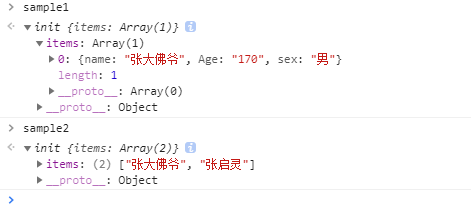LIINQ TO JS
记录一下,方便自己查找。。。
自己在开发前端时,对于处理JSON,觉得真是枯燥。处理数据,基本都要循环。 所以我想着前端也能跟后端一样,有Linq来处理我的JSON对象就好了。上网一搜,找到了JSLINQ.js。。实现了自己的需求,嘿嘿嘿。
首先是JSLINQ.js 代码。 下载地址
自己贴一下:
//----------------------------------------------------------------------- // Part of the LINQ to JavaScript (JSLINQ) v2.20 Project - http://jslinq.codeplex.com // Copyright (C) 2012 Chris Pietschmann (http://pietschsoft.com). All rights reserved. // This license can be found here: http://jslinq.codeplex.com/license //----------------------------------------------------------------------- (function () { var JSLINQ = window.jslinq = window.JSLINQ = function (dataItems) { return new JSLINQ.fn.init(dataItems); }, utils = { processLambda: function (clause) { // This piece of "handling" C#-style Lambda expression was borrowed from: // linq.js - LINQ for JavaScript Library - http://lingjs.codeplex.com // THANK!! if (utils.isLambda(clause)) { var expr = clause.match(/^[(\s]*([^()]*?)[)\s]*=>(.*)/); return new Function(expr[1], "return (" + expr[2] + ")"); } return clause; }, isLambda: function (clause) { return (clause.indexOf("=>") > -1); }, randomIndex: function (max, existing) { var q, r, f = function () { return this == r; }; if (!existing) { return parseInt(Math.random() * max, 10); } else { q = JSLINQ(existing); r = -1; while (r < 0 || q.Where(f).Count() !== 0) { r = utils.randomIndex(max); } return r; } } }; JSLINQ.fn = JSLINQ.prototype = { init: function (dataItems) { this.items = dataItems; }, // The current version of JSLINQ being used jslinq: "2.20", toArray: function () { return this.items; }, where: function (clause) { var newArray = [], len = this.items.length; // The clause was passed in as a Method that return a Boolean for (var i = 0; i < len; i++) { if (clause.apply(this.items[i], [this.items[i], i])) { newArray[newArray.length] = this.items[i]; } } return JSLINQ(newArray); }, select: function (clause) { var item, newArray = [], field = clause; if (typeof (clause) !== "function") { if (clause.indexOf(",") === -1) { clause = function () { return this[field]; }; } else { clause = function () { var i, fields = field.split(","), obj = {}; for (i = 0; i < fields.length; i++) { obj[fields[i]] = this[fields[i]]; } return obj; }; } } // The clause was passed in as a Method that returns a Value for (var i = 0; i < this.items.length; i++) { item = clause.apply(this.items[i], [this.items[i]]); if (item) { newArray[newArray.length] = item; } } return JSLINQ(newArray); }, orderBy: function (clause) { var tempArray = []; for (var i = 0; i < this.items.length; i++) { tempArray[tempArray.length] = this.items[i]; } if (typeof (clause) !== "function") { var field = clause; if (utils.isLambda(field)) { clause = utils.processLambda(field); } else { clause = function () { return this[field]; }; } } return JSLINQ( tempArray.sort(function (a, b) { var x = clause.apply(a, [a]), y = clause.apply(b, [b]); return ((x < y) ? -1 : ((x > y) ? 1 : 0)); }) ); }, orderByDescending: function (clause) { var tempArray = [], field; for (var i = 0; i < this.items.length; i++) { tempArray[tempArray.length] = this.items[i]; } if (typeof (clause) !== "function") { field = clause; if (utils.isLambda(field)) { clause = utils.processLambda(field); } else { clause = function () { return this[field]; }; } } return JSLINQ(tempArray.sort(function (a, b) { var x = clause.apply(b, [b]), y = clause.apply(a, [a]); return ((x < y) ? -1 : ((x > y) ? 1 : 0)); })); }, selectMany: function (clause) { var r = []; for (var i = 0; i < this.items.length; i++) { r = r.concat(clause.apply(this.items[i], [this.items[i]])); } return JSLINQ(r); }, count: function (clause) { if (clause === undefined) { return this.items.length; } else { return this.Where(clause).items.length; } }, distinct: function (clause) { var item, dict = {}, retVal = []; for (var i = 0; i < this.items.length; i++) { item = clause.apply(this.items[i], [this.items[i]]); // TODO - This doesn't correctly compare Objects. Need to fix this if (dict[item] === undefined) { dict[item] = true; retVal.push(item); } } dict = null; return JSLINQ(retVal); }, any: function (clause) { for (var i = 0; i < this.items.length; i++) { if (clause.apply(this.items[i], [this.items[i], i])) { return true; } } return false; }, all: function (clause) { for (var i = 0; i < this.items.length; i++) { if (!clause(this.items[i], i)) { return false; } } return true; }, reverse: function () { var retVal = []; for (var i = this.items.length - 1; i > -1; i--) { retVal[retVal.length] = this.items[i]; } return JSLINQ(retVal); }, first: function (clause) { if (clause !== undefined) { return this.Where(clause).First(); } else { // If no clause was specified, then return the First element in the Array if (this.items.length > 0) { return this.items[0]; } else { return null; } } }, last: function (clause) { if (clause !== undefined) { return this.Where(clause).Last(); } else { // If no clause was specified, then return the First element in the Array if (this.items.length > 0) { return this.items[this.items.length - 1]; } else { return null; } } }, elementAt: function (i) { return this.items[i]; }, concat: function (array) { var arr = array.items || array; return JSLINQ(this.items.concat(arr)); }, intersect: function (secondArray, clause) { var clauseMethod, sa = (secondArray.items || secondArray), result = []; if (clause !== undefined) { clauseMethod = clause; } else { clauseMethod = function (item, index, item2, index2) { return item === item2; }; } for (var a = 0; a < this.items.length; a++) { for (var b = 0; b < sa.length; b++) { if (clauseMethod(this.items[a], a, sa[b], b)) { result[result.length] = this.items[a]; } } } return JSLINQ(result); }, defaultIfEmpty: function (defaultValue) { if (this.items.length === 0) { return defaultValue; } return this; }, elementAtOrDefault: function (i, defaultValue) { if (i >= 0 && i < this.items.length) { return this.items[i]; } return defaultValue; }, firstOrDefault: function (defaultValue) { return this.First() || defaultValue; }, lastOrDefault: function (defaultValue) { return this.Last() || defaultValue; }, take: function (count) { return this.Where(function (item, index) { return index < count; }); }, skip: function (count) { return this.Where(function (item, index) { return index >= count; }); }, each: function (clause) { var len = this.items.length; for (var i = 0; i < len; i++) { clause.apply(this.items[i], [this.items[i], i]); } return this; }, random: function (count) { var len = this.Count(), rnd = []; if (!count) { count = 1; } for (var i = 0; i < count; i++) { rnd.push(utils.randomIndex(len - 1, rnd)); } rnd = JSLINQ(rnd); return this.Where(function (item, index) { return rnd.Where(function () { return this == index; }).Count() > 0; }); } }; (function (fn) { fn.ToArray = fn.toArray; fn.Where = fn.where; fn.Select = fn.select; fn.OrderBy = fn.orderBy; fn.OrderByDescending = fn.orderByDescending; fn.SelectMany = fn.selectMany; fn.Count = fn.count; fn.Distinct = fn.distinct; fn.Any = fn.any; fn.All = fn.all; fn.Reverse = fn.reverse; fn.First = fn.first; fn.Last = fn.last; fn.ElementAt = fn.elementAt; fn.Concat = fn.concat; fn.Intersect = fn.intersect; fn.DefaultIfEmpty = fn.defaultIfEmpty; fn.ElementAtOrDefault = fn.elementAtOrDefault; fn.FirstOrDefault = fn.firstOrDefault; fn.LastOrDefault = fn.lastOrDefault; fn.Take = fn.take; fn.Skip = fn.skip; fn.Each = fn.each; fn.Random = fn.random; })(JSLINQ.fn); JSLINQ.fn.init.prototype = JSLINQ.fn; })();
使用方式:
页面代码
<!DOCTYPE html> <html> <head> <meta name="viewport" content="width=device-width" /> <title>LinqToJS</title> <script src="~/Scripts/JSLINQ.js"></script> <script src="~/Scripts/jquery-1.6.2.min.js"></script> </head> <body> <div> <h3>linq to js</h3> </div> </body> </html> <script type="text/javascript"> $(function() { var str = "{\"zhang\":[{\"name\":\"张大佛爷\",\"Age\":\"170\",\"sex\":\"男\"},{\"name\":\"张启灵\",\"Age\":\"100\",\"sex\":\"男\"}],\"wu\":[{\"name\":\"吴邪\",\"Age\":\"25\",\"sex\":\"男\"}]}"; var list = JSON.parse(str); var sample1 = JSLINQ(list.zhang).Where(function () { return this.name == '张大佛爷'; }); var sample2 = JSLINQ(list.zhang).Select(function () { return this.name; }); return sample1; }) </script>
效果:就跟LINQ一样,没啥好说的,看一下方法格式就行
sample1 sample2



